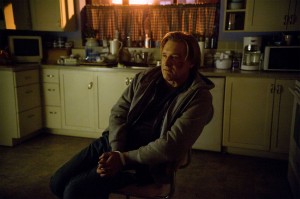Torchwood Miracle Day, Episode Nine: Global Drama?
 “He who fights with monsters should be careful lest he thereby become a monster. And if thou gaze long into an abyss, the abyss will also gaze into thee.”
“He who fights with monsters should be careful lest he thereby become a monster. And if thou gaze long into an abyss, the abyss will also gaze into thee.”
So argued philosopher Friedrich Nietzsche in Beyond Good and Evil, and it’s become something of a staple epigram for gothic fictions, as well as informing a television trope or two. Here, we finally get to discover what The Blessing is, and it literalises this Nietzschean aphorism. Could Russell T. Davies – whose highly recognisable voice begins the ep via a newsreader cameo – possibly not have had this infamous Nietzsche quote in mind when he pitched the idea: it’s a monstrous abyss, right through the centre of the Earth, which shows you your own true self. But if this is meant to provoke discussion over Miracle Day‘s philosophical stance it feels too on the money, and as yet too undeveloped, to really do so. Added to which, we’re very much not beyond good and evil in ‘The Gathering’. Instead there’s a depiction of banal villainy in the figure of the Category 1-hunting Finch, whilst Oswald’s status as a “monster” is again bluntly reinforced, and the CIA mole is little more than a ‘baddie’ cipher. So we’re given a Nietzschean CGI chasm that’s contradicted by non-Nietzschean, conventional moralities. “Institutional murder” referred to by newsreader/showrunner Davies raises the spectre of a society no longer capable of separating out ‘good’ and ‘evil’, but as an audience we’re clearly meant to be appalled by “Day 61 of the Great Depression”. What could have been a challenging representation of social (dis)order thus seems rather cartoonish as a consequence.
About midway through this series I pondered whether it would offer a sort of ‘Gaia Agenda’, and I’m tempted to put that option back on the table now that the Phicorp logo has surrendered its secrets. Not once did I think ‘why is that the logo?’, despite it being plastered all over the place, and the revelation of something “hidden in plain sight” feels dramatically satisfying in this case. Less so the discovery of the antipodean twist, though, which hinges on Rhys happening to have an inflatable globe to hand at the vital moment. Given the amassed talent of the writers’ room, could a more elegant route to this plot point not have been found? But the big reveal of the Blessing does raise one inevitable, intriguing question: just what will the Magical Crack in the World reveal to Captain Jack?
This episode hails from John Fay, the only other writer carried over from Torchwood ‘s prior UK life by showrunner Russell T. Davies. For my money, Fay penned one of the strongest episodes of Children of Earth, and also has form in the TV thriller department thanks to his ITV miniseries Mobile from 2007. Like Davies, Fay has combined work on UK soaps with social realist and genre fare; also like Davies, Fay has tended to root his TV writing in regional geographies (Mobile focuses partly on Liverpool-Manchester rivalries, for example). And Fay delivers some tense sequences in this episode, expertly hybridising kitchen-sink drama with the stuff of global conspiracy. All the sequences set in that Swansea house feel both very Davies-esque, and yet also of a piece with Fay’s writerly voice. Indeed, John Fay seems to enjoy combining the down-to-earth with outlandish fantasy – Mobile made pronounced use of one character’s fixation with bathroom fittings within its tale of murder and mesmerism; here, Fay fuses what’s required of him – key plot points and societal beats – with musings on Geraint missing his own bed, Rhys’s bathroom time being disrupted, and other details such as the value of storytelling, whether as a source of clues (The Devil Within) or as something vital to the Families (Jilly’s recruitment). The ordinary, the homely, and the human are repeatedly contrasted with extraordinary events.
One of the strongest ideas in this episode, however, lies in the CIA’s investigation and Charlotte’s analysis that they have “6 million suspects” – something like twice the population of Wales. This is a stunning concept: how could a force of so many millions ever be defeated in CSI-style or 24-mode? Just as Torchwood wasn’t designed to deal with politicians, how could it ever deal with a collective monster indistinguishable from the social fabric itself? But the notion is too subversive to be explored in any depth, and instead it’s quickly glossed over. Torchwood can’t fight society, or the system; its monsters need to be far more localised in order to be defeatable – like an abyss, which even if it runs through the Earth’s core can at least be tracked down, travelled to, and (presumably next week) gazed into by the Torchwood team. Davies’s solution to creating a ‘global’ TV drama, akin to his apparent use of Nietzsche, is to literalise, literalise, literalise – hence mistranslation is the Families’ favoured tool of concealment, and the globe itself hides or contains the Blessing. When TV screenwriting manuals advise that a global menace is needed, I’m not sure they’ve ever meant a CGI chasm running globally from pole to pole. But with this concept Davies definitively pre-empts any Fox or Starz executive giving him a note along the lines of ‘we like Miracle Day, but it needs a bigger scale of threat’. The miraculous Blessing, it turns out, is textbook global drama.


